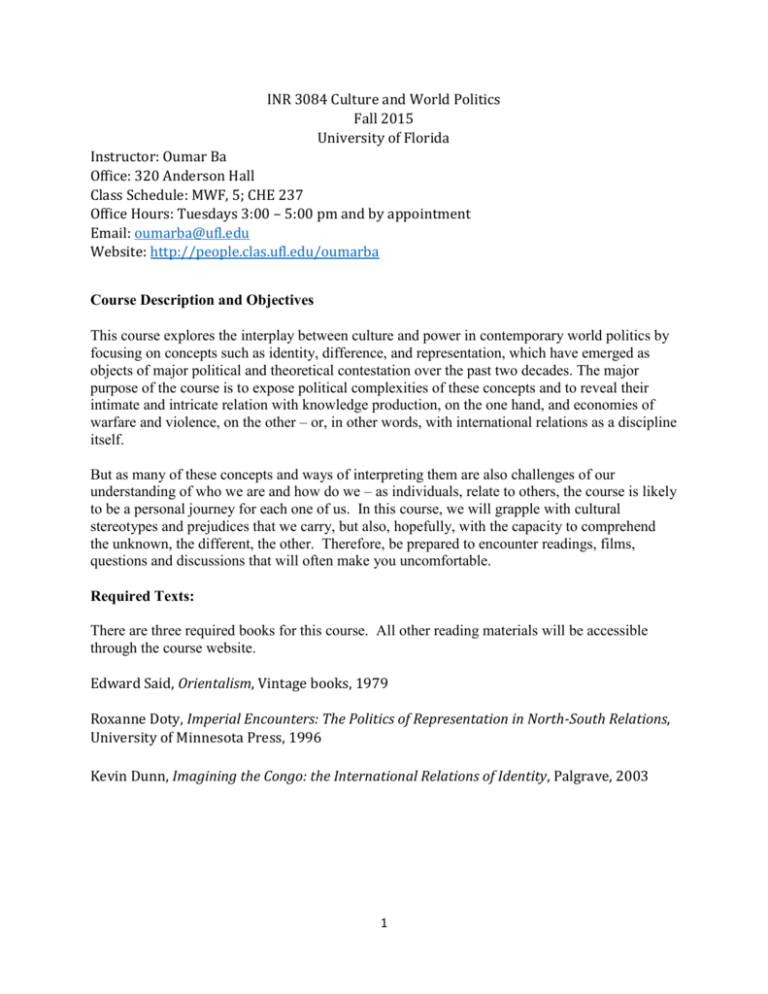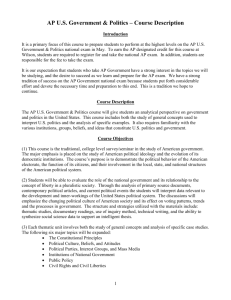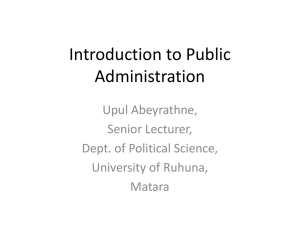INR 3084 Culture and World Politics Syllabus - People
advertisement

INR 3084 Culture and World Politics Fall 2015 University of Florida Instructor: Oumar Ba Office: 320 Anderson Hall Class Schedule: MWF, 5; CHE 237 Office Hours: Tuesdays 3:00 – 5:00 pm and by appointment Email: oumarba@ufl.edu Website: http://people.clas.ufl.edu/oumarba Course Description and Objectives This course explores the interplay between culture and power in contemporary world politics by focusing on concepts such as identity, difference, and representation, which have emerged as objects of major political and theoretical contestation over the past two decades. The major purpose of the course is to expose political complexities of these concepts and to reveal their intimate and intricate relation with knowledge production, on the one hand, and economies of warfare and violence, on the other – or, in other words, with international relations as a discipline itself. But as many of these concepts and ways of interpreting them are also challenges of our understanding of who we are and how do we – as individuals, relate to others, the course is likely to be a personal journey for each one of us. In this course, we will grapple with cultural stereotypes and prejudices that we carry, but also, hopefully, with the capacity to comprehend the unknown, the different, the other. Therefore, be prepared to encounter readings, films, questions and discussions that will often make you uncomfortable. Required Texts: There are three required books for this course. All other reading materials will be accessible through the course website. Edward Said, Orientalism, Vintage books, 1979 Roxanne Doty, Imperial Encounters: The Politics of Representation in North-South Relations, University of Minnesota Press, 1996 Kevin Dunn, Imagining the Congo: the International Relations of Identity, Palgrave, 2003 1 Course Format and Assignments To the greatest possible extent, the format of this course will be a discussion-oriented seminar. Therefore, students are expected to come in class having read, critically engaged with, and ‘digested’ all the assigned materials. Students must be ready to participate in class discussions, which will be factored in the final grade. Indeed, the overall success of the class will depend to a significant degree on your willingness to engage in conversations about the course material. Your successful completion of this class will be depend on the following components: - - - Attendance and Participation: You are expected to attend all classes and be physically present. You will lose points for each unexcused absence. Being physically present means also that your active participation in class discussions is required. Your participation must reflect that you have read and critically engaged with the assigned materials. Three “Reading Responses” (2 pages each): You will critically reflect on and respond to the assigned readings for a class session. The point of this exercise is not for you to summarize the readings – I already know what’s in there. You must offer a critical analysis of the author’s arguments. The students who will make the readings ‘speak to’ other readings or themes discussed in class will receive a higher grade. You must submit this assignment on CANVAS by 10am, prior to the class during which the readings will be discussed. You are free to pick any day for this assignment, but you must submit the first reading response by 23 September and the second one by 23 October. Two papers (7-8 pages): I will give you the prompts for these essays two weeks before their due date. Five pop-quizzes: These are designed to keep students up to date with the class readings. They are short and simple – assuming that you have done the readings. These quizzes will NOT be announced in advance and there is no make-up for missed quizzes. Grading The assignments listed above carry the following weights in the final, overall grade: Assignment Percent of Grade Attendance and Participation 15% Quizzes 15% Reading Responses 30% (10% each) Papers 40% (20% each) 2 The letter grades on papers will be based on three major, closely related criteria: • Evidence--how good is your command and deployment of the relevant course material, and are you employing the best evidence available to make your points; • Interpretation—have you developed an argument or point of view that is pertinent to the issue at hand, and that has breadth, coherence, and insight; and • Expression (style) – is the prose (writing) clear, concise, and engaging? I will evaluate these criteria equally, and they will translate into letter grades as follows: • A—Excellent: Your work is outstanding in all three areas. It offers an integrated, insightful argument based on ample, sound evidence and is written in clear and engaging prose. • B—Good: Your work is strong in all three areas, or is outstanding in one area while having significant weaknesses in another. • C—Average: Your performance is adequate in one or more areas, but also has significant weaknesses in others, leaving the presentation fragmented, murky, or narrow. • D—Poor: Your work demonstrates notable weaknesses in all three areas. Remedial work may be needed to improve substantive understanding or basic communication skills. • E—Unacceptable: Your work has serious flaws in all areas, or demonstrates limited engagement in the assignment. Attendance and Participation grades will rest on your physical presence in class and your discussions of the readings and engagement in class activities. An attendance sheet will be circulated for every class. Adequate in-class participation will indicate that you did the readings and were actively engaged in discussion. If you have questions or if you feel uncomfortable speaking in front of others, please see me as early in the semester as possible. The letter grades for papers and for final course grades are assigned according to the following numerical scales: Letter Grade Numerical Paper Grade Numerical Final Grade GPA Equivalent (Final Grades) A 95 93 and above 4.0 A- 91 90-92 3.67 B+ 88 87-89 3.33 B 85 83-86 3.0 B- 81 80-82 2.67 3 C+ 78 77-79 2.33 C 75 73-76 2.0 C- 71 70-72 1.67 D+ 68 67-69 1.33 D 65 63-66 1.0 D- 61 60-62 0.67 E Below 60 (varies on case by case basis) Below 60 0.0 E1 Stopped attending or participating prior to the end of class 0.0 I Incomplete (Note: I will most likely refuse to agree to these) 0.0 Policies and Expectations Classes in the social sciences are most rewarding when students interact with the course material, each other, and the instructor on a sustained and regular basis. Effective class participation (see above) is therefore essential. You can expect an atmosphere in which students express and receive opinions in a thoughtful and respectful manner. It also is important to note that many of you will hold very strong opinions about the issues we will be discussing during the semester. I encourage reasonable disagreement, lively debate, and challenging assumptions and preconceptions as long as all students remain respectful of one another. Being respectful includes listening carefully to the views of others as well as articulating your points as clearly and concisely as possible. No student should attempt to dominate discussion or engage in lengthy monologues or diatribes. At the same time, you are expected to attend all classes and to be respectful of yourself, other students, and the instructor at all times. In addition to arriving in a timely manner, this includes, but is not limited to, refraining from text messaging, playing cell phone or computer games, checking email, surfing the web, reading newspapers or other non-course related material, and other distracting behavior. I will remind students of these general guidelines as necessary, and will ask students who fail to observe them to leave class. Students who persist with such behavior will receive grade penalties. 4 I will post paper topics at least two weeks before the due date. You are expected to submit papers electronically through the CANVAS course management system. I will accept papers up to one week after the due date, but with a significant penalty of 1/3 of a letter grade for each day they are late. Concerns about grades on specific assignments will be handled in the following manner. I will observe a "twenty-four hour rule" when papers are returned. In short, this means that I am happy to entertain questions about grades and comments on papers, but students must wait twenty-four hours from when they receive their paper back to initiate the request. Students with concerns about how their papers have been graded should feel free to see me. Students should not worry that they will be penalized for engaging in this process, as I will not reduce a grade that has been appealed (though I may or may not raise it). Students with grade concerns should initiate the process by contacting me within one week of when the assignment is returned. Cheating in any form undermines the integrity and mutual trust essential to a community of learning and places at a comparative disadvantage those students who respect and work by the rules of that community. It is understood that any work a student submits is indeed his/her own. Plagiarism—that is, lifting without giving credit from something someone else has written such as a published book, article, or even a student paper—is forbidden and is, in fact, fairly easily detected. All work submitted by students will be run through a plagiarism detection software. Please review the University’s policies regarding student conduct and conflict resolution, available through the Dean of Students Office website. Students requesting classroom accommodation must first register with the Dean of Students Office, which will provide documentation to the student who must then provide this documentation to the professor when requesting accommodation. For more information regarding University policies on this issue, please visit the Disability Resource Center's website. 5 COURSE SCHEDULE M 8/24 Introduction Getting started: Debating (American) Culture W 8/26 Samuel Huntington, “The Hispanic Challenge,” Foreign Policy, March/April 2004 Russell Shorto, “How Christian Were the Founders?” The New York Times, 11 February 2010 http://www.nytimes.com/2010/02/14/magazine/14texbookst.html Conceptualizing Culture F 8/28 William H. Sewell, “The Concept(s) of Culture” in Victoria E. Bonnell and Lynn Hunt (eds.) Beyond the Cultural Turn: New Directions in the Study of Society and Culture (University of California Press, 1999), pp. 35-61 M 8/31 Lisa Wedeen “Conceptualizing Culture: Possibilities for Political Science,” American Political Science Review, 96:4, December 2002, pp. 713-728 Jutta Weldes and Christina Rowley: "So How Does Popular Culture Relate to World Politics?" in Popular Culture and World Politics: Theories, Methods, Pedagogies. E-IR, 2015, pp. 11-34 The Cultural Turn W 9/2 Said, Orientalism, Introduction, pp. 1-28 F 9/4 Said, Orientalism, Chapter I pp. 31 – 72 M 9/7: Holiday (Labor Day) W 9/9 Said, Orientalism, Chapter II, pp. 73-92 6 F 9/11 Said, Orientalism, Chapter III, pp. 201-254 M 9/14 Said, Orientalism, Chapter III, pp. 284- 328 W 9/16 Workshop with Political Science Librarian Dr. David Schwieder F 9/18 Inglehart, Ronald, "The Renaissance of Political Culture," American Political Science Review 82(4), 1988, pp. 1203-30 Yosef Lapid “Culture’s Ship: Return and Departures in International Relations Theory “ in The Return of Culture in IR Theory, Lynne Rienner Publishers, 1996 M 9/21 Samuel Huntington, “Clash of Civilizations” Foreign Affairs, Summer 1993, pp. 22-49 https://www.foreignaffairs.com/articles/united-states/1993-06-01/clashcivilizations W 9/23 Edward Said, “Between Worlds” London Review of Books, 20:9, May 7, 1998 Rutherford, Jonathan (1990), The Third Space. Interview with Homi Bhabha. LAST CHANCE TO SUBMIT READING RESPONSE 1 Identity and national culture F 9/25 Stuart Hall, “Ethnicity: Identity and Difference” in Geoff Eley and Ronald Grigor Suny (eds.) Becoming National: A Reader, pp. 338-349 Hall, “The question of cultural identity” in Modernity: An Introduction to Modern Societies, Hall et. Al (eds.), Blackwell Publishers, pp. 593-623 IR and Culture: Representation M 9/28 Doty, Imperial Encounters, Introduction (pp-1, 22) 7 W 9/30 Doty, Imperial Encounters, Chapters 2 and 3 (pp. 23-74) F 10/2 Doty, Imperial Encounters, Chapters 4 (pp. 75-98) M 10/5 Doty, Imperial Encounters, Chapter 6 (pp. 125-144) W 10/07 Doty, Imperial Encounters, Chapter 7 and Conclusion (pp. 145-172) F 10/09 Film: Concerning Violence (2014), directed by Göran Olsson Representation and the international relations of identity M 10/12 Dunn, Imagining Congo, chapter 1 (pp. 1-20) W 10/14 Dunn, Imagining Congo, Chapter 2 (pp. 21-60) F 10/16 Dunn, Imagining Congo, Chapter 3, pp. 61-104 M 10/19 Film: Lumumba, directed by Raoul Peck, 2000 W 10/21 Dunn, Imagining Congo Chapter 4, pp. 105-138 F 10/23 Dunn, Imagining Congo Chapters 5 and 6 (pp. 139-182) LAST CHANCE TO SUBMIT READING RESPONSE 2 M 10/26 Iver Neumann, Uses of the Other: The ‘East’ in European identity Formation, University of Minnesota Press, 1997 [Chapter 1: Uses of the Other in World Politics, pp. 1-37] 8 W 10/28 Neumann, Uses of the Other, Chapter 2: Making Europe: The Turkish Other pp 39-63 Marl Meyer, “Who Gets to Be French?” New York Times, 11 April 2012 http://www.nytimes.com/2012/04/12/opinion/who-gets-to-be-french.html Laurent Dubois, “The Blood of the Impure”, Africa is a Country, 20 March 2013 http://africasacountry.com/2013/03/the-blood-of-the-impure/ Culture, the War on Terror, and geographies of violence F 10/30 Klaus Doods, "Popular geopolitics and War on Terror", in Popular Culture and World Politics: Theories, Methods, Pedagogies. E-IR, 2015, pp. 51-62 Debrix, Francois, Tabloid Terror War, Culture and Geopolitics, Chapter 3: Discourses of War, Geographies of abjection: American intellectuals of statecraft and the avenging of 9/11. pp 69-89. M 11/2 Shapiro, Michael J. (2007), "The New Violent Cartography" Security Dialogue, 38(3): 291-313 Graham, Stephen (2006), Cities and the ‘War on Terror’. International Journal of Urban and Regional Research, 30: 255–276 Culture, Knowledge Production, and the War on Terror W 11/04 Vanessa Gezari, The Human Terrain System sought to transform the army from within, NEWSWEEK http://www.newsweek.com/2013/08/16/human-terrainsystem-sought-transform-army-within-237818.html Documentary: Human Terrain: War Becomes Academic (2010), directed by Der Derian, Udris and Udris. F 11/06 Homecoming M 11/09 Zehfuss, M., 2012. “Culturally Sensitive War? The Human Terrain System and the seduction of ethics.” Security Dialogue, 43(2), pp. 175-190. 9 Ilieva, Evgenia, 2015. “Human Terrain Systems and Reflexivity” in Reflexivity and International Relations, Jack Amoureux and Brent Steele (eds), Routledge W 11/11 Veterans Day Culture, Human Rights and World Politics F 11/13 Hopgood, Stephen, 2014. The Endtimes of Human Rights, Cornell University Press. (Introduction and Chapter 4: The moral architecture of suffering) M 11/16 Hopgood, The Endtimes of Human Rights (Chapter 7: Of Gods and Nations) W 11/18 Responses to Hopgood: Debating the Endtimes of Human Rights: Activism and Institutions in a Neo-Westphalian World https://www.amnesty.nl/sites/default/files/public/debating_the_endtimes_of_hum an_rights.pdf Read responses by Barnett, Landman, and Crawshaw (pp. 1138) Michael Ignatieff, The Attack on Human Right, Foreign Affairs, 2001 F 11/20 Guest Lecture – TBD. I will be at a conference Culture, Identity, and the Politics of Liberal Humanitarianism M 11/23 Video KONY 2012 https://www.youtube.com/watch?v=Y4MnpzG5Sqc Teju Cole, “The White Savior Complex”, The Atlantic, March 21 2012 http://www.theatlantic.com/international/archive/2012/03/the-white-saviorindustrial-complex/254843/ W 11/25 Thanksgiving F 11/27 Thanksgiving M 11/30 Mahmood Mamdani, Saviors and Survivors: Darfur, Politics, and The War on Terror, Doubleday, 2009 (Chapter 2: The politics of the movement to save Darfur) 10 W 12/2 Martha Finnemore, “Constructing Norms of Humanitarian Intervention” in Katzeinstein, The Culture of National Security: Norms and Identity in World Politics, Columbia University Press, 1996. Mahmood Mamdani, Saviors and Survivors: Darfur, Politics, and The War on Terror, Doubleday, 2009 (Conclusion: Responsibility to Protect or Right to Punish? pp. 271300) F 12/4 Michael Barnett, Empire of Humanity: A History of Humanitarianism, Cornell University Press, 2013 (Chapter 9: Armed for Humanity pp. 172- 194 and Conclusion: Empire of Humanity pp.220-240). LAST CHANCE TO SUBMIT READING RESPONSE 3 M 12/7 TBD W 12/9 Wrap-up M 12/14: Final Paper due, 10am on CANVAS 11








